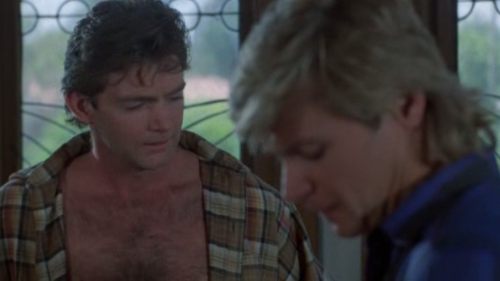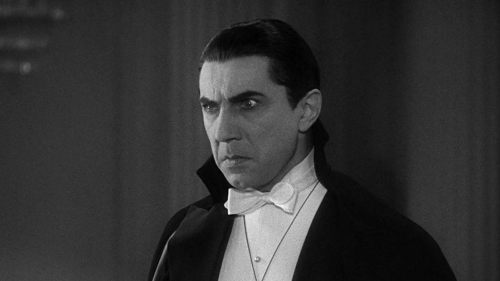Queer Underworld: JENNIFER’S BODY (2009)
It’s a common adage that, in fiction, the monster is never just a monster. Horror, science fiction, and fantasy are the venues through which we explore ideas through metaphor and allegory, sometimes unintentionally through the lens of an audience who connects with a work’s themes in a manner specific to them. Such is the case with all manner of LGBTQ cinema, which has often relied on metaphor to smuggle queer themes into cinemas or been subject to queer interpretations after the fact. We at Birth.Movies.Death want to give those queer readings of genre films a voice. This is Queer Underworld.
I’ll admit that, like many of us, I was initially dismissive of Jennifer’s Body when it came out a decade ago, in no small part due to my unwarranted distaste for Megan Fox. And sure, there’s still room to argue whether or not Diablo Cody’s trademark teen dialogue is suitably stylistic or gratingly extra, but a lot of sentiment at the time ascribed the film as vapid and inconsequential, again because of Fox’s titular role. But Jennifer’s Body, in ironic subversion of its title, is about much more than the physical attractiveness of its star, exploring the use of feminine physicality as a means to use and influence straight men, to treat sex as a weapon that women can use to consume their male hosts.
But let’s talk about the women of Jennifer’s Body.
This story is laser-focused on the lifelong friendship of two teenage women: Needy (Amanda Seyfried) and Jennifer (Megan Fox). As Needy raptly stares at her best friend’s performance in the color guard, a classmate calls her out as “totally lesbi-gay,” which in 2009 was still a cinematically acceptable insult among high schoolers but additionally functions as an early indication of the kind of relationship that Needy and Jennifer share. They don’t engage with each other sexually, but their extreme familiarity with one another and insistence on maintaining BFF status despite having wildly different personalities and social circles is telling, or at the very least conspicuous. And yet, despite the film’s early allusions to Needy’s attraction to Jennifer, she isn’t the one dealing with unrequited attraction. Jennifer is.
The film takes a moment at one point to flash back to when Needy and Jennifer shared space in the sandbox as children. Needy treats Jennifer’s injury by sucking away the blood and promises to never tell on Jennifer. It’s the sort of intimate act that would unquestionably be considered the precursor to lifelong romance in a two-gendered pairing, but here it establishes, at least on the surface, that Needy and Jennifer have a friendship with deep and lasting roots. But we receive further indications that their friendship was more than mutually platonic, as Jennifer alludes to how they used to pretend to be boyfriend and girlfriend, would share the same bed during sleepovers, and have a connection so deep that it mimics telepathy. In other words, the evidence indicates that the girls have a history of playacting the roles in a romantic relationship and have a bond that almost supernaturally reflects that.
But as their childhoods were left behind, the girls became more distinct from one another. Needy became a teenager more focused on school than her appearance, but she also has a stronger relationship with her peers, notably her boyfriend Chip (Johnny Simmons). Jennifer, on the other hand, isn’t shown to have anything more than superficial relationships with anyone save Needy, having a reputation for sleeping around with boys and being conventionally attractive, which only bears the shallow indicators of so-called popularity. Even when she spends time with Needy, Jennifer is bossy, sometimes literally pushy, and generally insensitive to Needy’s wants, dragging her along to a night at the bar to pick up a guy from a band without any promise that the night will be fun for Needy. And it’s that undiscriminating sexual availability to men that results in her sacrifice and transformation into a succubus.
This characterization makes Jennifer out to be vapid and self-serving, which raises the question of why Jennifer even bothers with Needy, and I think the answer lies in the difference between romantic and sexual attraction. Even though it’s played off as a joke after Jennifer’s transformation, she does explicitly state that she “goes both ways,” that she is bisexual. There is even a scene in which Jennifer explicitly tries to seduce Needy. Given Jennifer’s and Needy’s history together, it isn’t too much of a stretch to realize that Jennifer might have romantic feelings for Needy, and that their continued closeness to one another is symptomatic of a longing Jennifer has for the forbidden fruit of a same-sex friend.
This would explain why, despite clearly being sexually active, Jennifer never appears to have actually had a boyfriend. It explains why Jennifer and Chip don’t get along, even beyond Jennifer’s apparently abrasive personality. Perhaps most importantly, though, it explains why post-transformation Jennifer explicitly wants to feed on men that Needy finds attractive and with whom she shares emotional connections. Despite starving for another meal, Jennifer initially turns down Colin (Kyle Gallner) for a date because his emo love of Rocky Horror just isn’t her style. But when she observes that Needy likes him, Jennifer changes her mind. She recognizes that Needy wants him, and her jealousy – potentially subconscious – is what drives her to select Colin as her next victim.
This extends to the film’s climax, in which Jennifer attempts to seduce Chip after he and Needy have broken up. The seduction fails, prompting Jennifer to just attack Chip anyway, and as Needy fights Jennifer off, she cuts deep into Jennifer’s insecurities, calling out the self-destructive effort Jennifer undertakes to remain so skinny and hot. Assuming that previously explored romantic subtext is genuine, this moment is not just a best friend burning a bridge on a lifelong relationship; it’s Jennifer’s enduring crush calling her out on how her efforts to appear attractive and stoke Needy’s jealousy will never be enough. Needy isn’t attracted to women, or at least isn't sexually attracted to Jennifer, and nothing Jennifer does will ever change that.
This is why Jennifer’s and Needy’s connection is so important in the final confrontation. It might seem like a stretch to think that Jennifer’s powers simply leave her after Needy rips the heart-shaped BFF locket from her neck, unless you take more stock in the symbolism of the heart than the blood-obscured letters that adorn it. Needy stabbing Jennifer through the heart is just the literal escalation of that symbol, and the fact that it ultimately defeats Jennifer as a jealous avatar of destruction only further cements that significance.
Yes, Jennifer is a ravenous, murderous monster, but looking at her through a queer lens also makes her out to be a tragic figure. Her first crush, secret and unrequited, drove her to become a monster, starting with the benign act of giving over to unromantic sex and ultimately being driven by her jealousy to try to destroy the life of the woman she’s loved since childhood. In a sense, her inability to be honest with herself about those feelings, whether through internalized or external homophobia, was the driving force behind her rampaging desire to feed. And maybe there’s a bit more going on in Jennifer’s mind than what was initially sold to us as just Jennifer’s Body.



